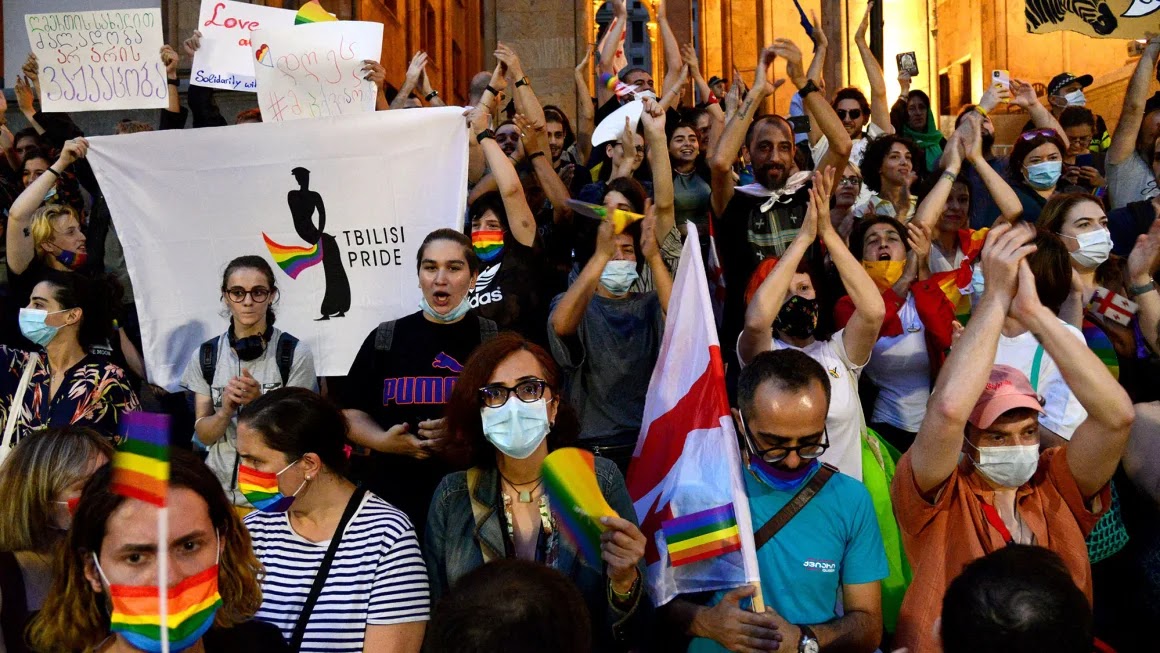Georgia’s parliament has recently passed legislation restricting LGBTQ+ rights with similar laws implemented in Russia.
The bill, introduced by the ruling Georgian Dream party earlier this year, includes a ban on same-sex marriages, adoption by same-sex couples, public endorsements of LGBTQ+ identities, and depictions of LGBTQ+ individuals in media.
 |
| Participants hold rainbow flags at a march in Tbilisi, Georgia July 6, 2021. Vano Shlamov/AFP/Getty Images |
Additionally, the legislation prohibits gender-affirming care and changes to gender designations in official documents. These restrictions follow another controversial law from June, which forced media and non-governmental organizations receiving more than 20% of their funding from foreign sources to register as "pursuing the interests of a foreign power." Critics have labeled this measure as part of a broader trend of laws inspired by Russia, further aligning Georgia’s policies with Moscow’s.
Georgia’s Orthodox Church wields considerable influence, and opposition to LGBTQ+ rights is widespread in the country. In 2022, protests led to the violent disruption of an LGBTQ+ festival in the capital, Tbilisi. This year, a large march was held in support of "traditional family values," a term frequently used to justify anti-LGBTQ+ policies.
Russia has similarly adopted a hardline stance on LGBTQ+ rights over the past decade, banning public support for "nontraditional sexual relations" and enacting laws that prohibit gender-affirming care. Russia’s Supreme Court has further escalated these efforts by classifying LGBTQ+ activism as an extremist activity, effectively banning it in the country.
The recent legislation in Georgia is seen by many as an effort by the ruling government to move closer to Moscow's policies ahead of elections. Georgian Dream, which has long been accused of tilting the country back toward Russian influence, claims that the new law is necessary to protect traditional family values.
 |
| Police block Georgian opponents of gay rights as they try to interfere a pride party in Tbilisi, Georgia, Saturday, July 8, 2023. (AP Photo/Zurab Tsertsvadze, File) |
However, Georgia’s President Salome Zourabichvili, a vocal critic of the Georgian Dream party, has vowed to block the bill. Although her position is largely ceremonial, and the government has enough parliamentary support to override her veto, her opposition highlights a growing divide in Georgia’s political views.
Meanwhile, public opinion in Georgia remains largely against LGBTQ+ rights, with widespread disapproval of same-sex relationships and frequent violent attacks on Pride marches. While the country’s constitution already bans same-sex marriages, this new legislation deepens the nation’s stance against the LGBTQ+ community, extending to outlawing Pride events, public displays of the rainbow flag, and censoring LGBTQ+ depictions in books and films. Georgian Dream leaders argue that the law is necessary to uphold the country’s traditional values, which resonate with a large portion of the population.
Georgia’s approach mirrors a broader trend in Eastern Europe, where many countries lag behind in protecting LGBTQ+ rights. Hungary and Bulgaria have also passed anti-LGBTQ+ laws, following a similar path to Russia. These countries have implemented so-called "propaganda" laws that suppress LGBTQ+ visibility in public spaces and media, positioning themselves at the bottom of European rankings on LGBTQ+ rights.
The adoption of the new bill is also part of a broader political strategy. Despite Georgia’s aspirations to join the European Union, the ruling government appears to be moving closer to Russia’s policies, especially with elections approaching.
This shift risks straining Georgia's relations with the EU, as the bloc places high importance on democratic freedoms, including LGBTQ+ rights. In the past, efforts to adopt policies reminiscent of Russia’s have sparked protests, such as those against the "foreign agents" law, which many saw as a threat to Georgia's democracy. Although President Zourabichvili vetoed the law, the government was able to override her decision.
Georgia’s new legislation signals a troubling step backward for LGBTQ+ rights in the country, aligning it more closely with Russia and other Eastern European nations that have adopted similar discriminatory policies.
What's your reaction?

